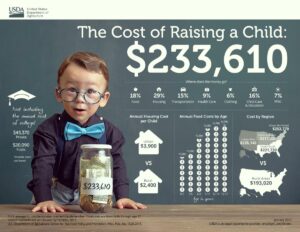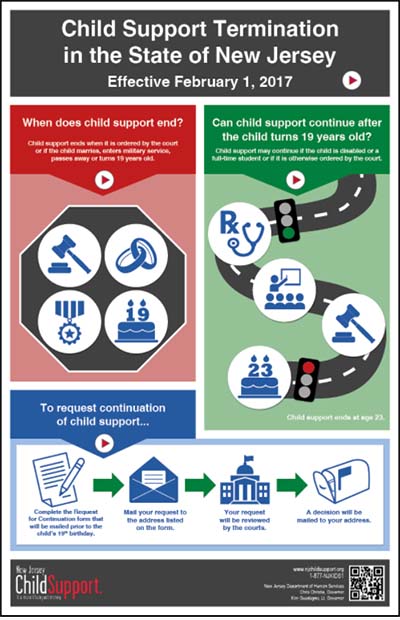
According to the CNPP, families with lower incomes are expected to spend $174,690 and families with higher incomes are expected to spend $372,210 from birth through age 17. The data for this study were collected from the 2011-15 Consumer Expenditure Survey. Obviously the cost of raising children absorbs a major share of any household budget. The USDA has been tracking the cost of raising a child since 1960. This most recent information comes from the Consumer Expenditures Survey.
Given costs of this magnitude, it is no wonder families are concerned about who gets child support, how much, and is it enough. The attorneys at Jacobs Berger, LLC, have the experience necessary to handle child support and college expense issues, and partner with you to make work out the best decisions for your financial future.
Housing accounts for the largest share of child rearing costs. The study finds that housing represents 26 to 33 per cent of the total expenses in a two-child, married-couple family. For families in the middle-income group, food and child care/education were the next largest average expenditures on a child, accounting for 18 and 16 percent of child-rearing expenses, respectively. It should come as no surprise that the costs of raising a child were highest in three regions across the country, the urban Northeast among them, where housing costs contribute significantly to that distinction.
In fact the average cost for families living in New Jersey was $253, 770, higher than the national average. According to Advocates for Children of New Jersey, the Garden State has among the highest costs in the nation. New Jersey also has a high percentage of working parents which means spending on child care costs make up a large portion of child rearing costs. The Economic Policy Institute says New Jersey is ranked 14th out of 50 states and the District of Columbia for the most expensive infant care. Working families rely on child care for the first five years of a child’s life before they’re school age, making those years the most expensive.
The expenses for single-parent families generally followed the same pattern as expenses for a child in married-couple families. It is also important to note that expenses increased as household income levels rose and more is spent, as children grow older. But because single-parent families have one less potential earner, their total household income is lower and child-rearing expenses consume a greater percentage of income.
Report author and CNPP economist Mark Lino, PhD, says the number of children in the household also impacts child-rearing costs. As family size increases, costs per child generally decrease. Lino says that’s because resources can be used by more than one child (sharing a bedroom, re-using clothing, toys, etc.).
The federal government has a number of useful websites aimed at helping families with their budgets. The Director of the office of Financial Security for the U.S. Department of the Treasury says MyMoney.gov can help with preparing a budget and can provide money management lessons for children. For families interested in learning about lowering their food costs the CNPP suggests ChooseMyPlate.gov/budget.
How are Child Rearing Costs Shared According to NJ Law?
Child support is awarded in a variety of residential living arrangements and there are specific guideline considerations when there is a true shared residential arrangement (e.g. each party has fifty percent of the parenting time with the child(ren)). “Child support” has a very specific definition of what is included and what is excluded, and can be found in Appendix IX-A of the New Jersey Child Support Guidelines. Generally, however, the components include the cost to feed, shelter and clothe a child. Residual expenses such as out of pocket (unreimbursed) medical costs, day care expenses and extracurricular activities can be included in the calculation of child support amounts but can also be handled separately.
Some states factor child support by considering both parents’ incomes. New Jersey is one of those states. It does not base child support on a percentage of the net income of the person paying the support (i.e. the “payor”). It relies on a number of factors which are components of the Guideline awards. Deviation from the set guidelines is allowed but must be explained in detail in any settlement agreement or court order.

When Does Child Support End?

- Court orders that provide for a different termination milestone,
- The child gets married, or
- The child enters the military
Child support can continue beyond the age of nineteen when:
- The child has a physical or intellectual disability that existed prior to reaching the age of 19
- The child is a full time student in either high school, vocational school, college, or a secondary educational program, in graduate school, or another post-secondary educational program
- Court order specifying another date of emancipation
If any of these exemptions extend the period of child support, child support ends at the age of 23 in all cases.
This infographic, found on the New Jersey Child Support website: gives guidance in understanding the basics about the new law.
Being informed about the costs associated with raising children can help us make better decisions for the future.
For more information or if you need legal assistance with New Jersey’s Child Support Guidelines, give our office a call at 973-710-4366.






